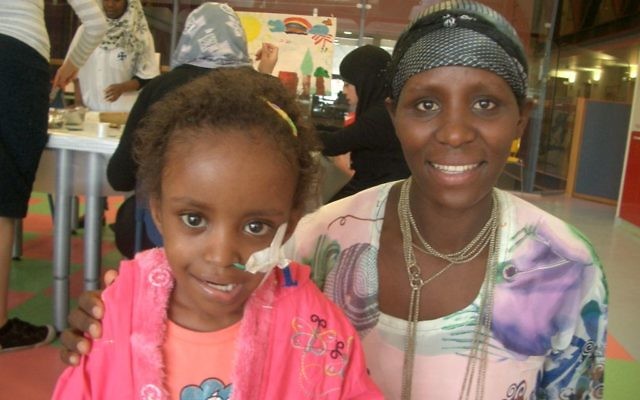Atlantan Angry at Israel for Forgetting Ethiopians
This is a failure of the Israeli government to do what it says it will do
Gene Rubel doesn’t mince words to express his outrage with the government of Israel.
Rubel, a Pittsburgh native who has lived in Atlanta for 20 years, isn’t complaining about settlements or the lack of egalitarian prayer at the Western Wall. Instead, he uses terms such as “bureaucratic malfeasance” and “racism” about the behavior of the Israeli government toward Jews still living in squalor in Ethiopia, waiting to immigrate to Israel and be reunited with family members there.
“I heard a lecture a few weeks ago in which it was said that there are no more Jewish refugees in the world anymore; that’s not true,” Rubel said. “Some of these Ethiopians have been there for 20 years waiting to go to Israel. Some people are saying it’s necessary to build a social welfare program to help them in Ethiopia, but there already is one in Israel.”
Since the early 1950s, the Jewish Agency for Israel has helped 90,000 Ethiopians make aliyah.
But Rubel’s complaints are related to a decision the Israeli government made in August “to establish a system to interview people and make a list of those eligible to still make aliyah. In 2016, none were brought; 1,600 are supposed to be brought this year.”

He said the Interior Ministry is supposed to create a list but hasn’t done it. “The Ministry of Absorption funding is available. The people just need to go through a two-minute conversion because they are already Jewish. The primary list is based on those who have relatives in Israel. The funds are allocated to hire people and for the travel.”
But nothing is happening, so Rubel, a former CEO of Jewish Healthcare International, has decided to start a movement to pressure the Israeli government to fulfill its commitment.
“This is a failure of the Israeli government to do what it says it will do. These Ethiopians don’t have any advocates,” he said. “I decided I need to create a grassroots push in Israel and the United States.”
Rubel, who lived in Israel as a child in 1954 and as a college student in 1961, is fluent in Hebrew and has two children who made aliyah. He said he keeps up with news from Israel more than news in Sandy Springs.
Enlisting the help of Melissa Goldberg, a marketing communications professional, Rubel has launched a website (www.aliyafalashmura.org) to explain the situation of the Ethiopian Jews, referred to as Falashmura, and enlist the support of American Jews and Israelis.
He initiated meetings with local rabbis by talking with Congregation Or Hadash Rabbi Analia Bortz and presented his campaign on behalf of the Ethiopians at a recent Shabbat service there. He is reaching out to other rabbis and Jewish community leaders to urge them to spread the word and contact Prime Minister Benjamin Netanyahu and other Israeli leaders.
Rubel’s activism isn’t limited to the United States. He has enlisted the support of the Jewish Agency, which appears ready to help settle the Ethiopians in Israel. But a planeload of about 17 families, all identified before the Israeli government’s August decision, was postponed from May 17 and now is scheduled for Tuesday, June 6.
Rubel has reached out to the Israeli Ministry of Interior, which is supposed to create the new lists of eligible Ethiopians. He has requested a weekly report on the number of those interviewed and the number registered as meeting the criteria, but he hasn’t received a response. “Given the three-week period for Ministry of Health and other processes between the time a family is registered and flown, I infer that no new registrations have been processed by the Ministry of Interior. As we say in Hebrew, busha vecherpa: They should be ashamed.”
Referring to the latest delay, Rubel said the interviewing of families to determine eligibility for aliyah was supposed to take place last fall. “It is a disgrace that we are now almost five months into 2017, and not a single family has been registered. Meanwhile, thousands of people are living in hovels with little food and no medical care. It is a disgrace that the Israeli government has allowed this to happen and even a greater disgrace that there is virtually no organized condemnation of this sorry state of affairs. Where are the Israeli human rights organizations? Where is the U.S. Jewish community? Where are the rabbis? Where are the shuls? Where are the Jewish Federations?”
He said he wrote to several Knesset members who conducted a hearing in March, but he has received no response. The Times of Israel reported in March that Knesset members Eli Alaluf (Kulanu), David Amsalem (Likud) and Avraham Neguise (Likud) accused the Interior Ministry of setting “deliberate obstacles to scuttle Ethiopian aliyah.”
The Times of Israel also reported that the last plane carrying Ethiopians, with 63 aboard, arrived at Ben Gurion International Airport in October.
“I’m trying to raise public awareness of this issue,” Rubel said. “We have some people who are in trouble, and I want to know, what are we going to do to help them?”
He said Israel suffers from substantial racism and classism, resulting in a disproportionate number of Ethiopian immigrants working as hotel cleaners.
His goal right now is for the first Ethiopian Jew identified under the Israeli government’s August decree to be transported to Israel, Rubel said. “Once the first one goes, that means there’s a process in place. Then we’ll figure out how to get the rest to Israel. The objective is to have 50 olim every month, but if there’s the reported 9,000, it’s going to take a while to get them all to Israel.”




comments